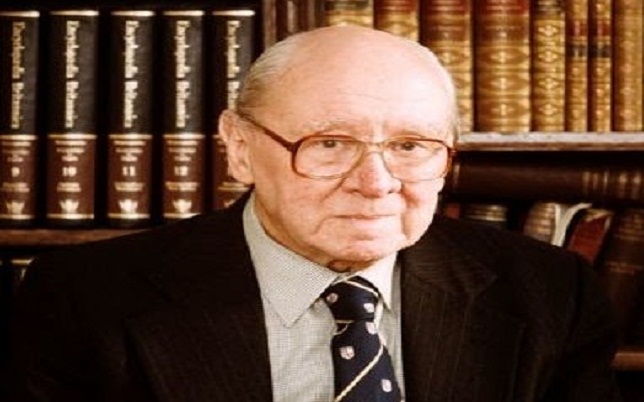William Montgomery Watt was a noted Orientalist and one of the key historians of Islam in the West. He made a general appraisal of the Prophet Muhammad’s personality and achievements. His views regarding the Prophet Muhammad (peace be upon him) have had considerable impact on British students and writers of Islam.
Watt’s academic approach to Prophetic life had contributed greatly to the significant shift in the Christian biographical approach to the Prophet Muhammad (peace be upon him) from “confrontation to dialogue”.
Watt’s works about Prophet Muhammad (peace be upon him) mainly including ‘Muhammad in Mecca‘ (1953), ‘Muhammad in Medina‘ (1956) and ‘Muhammad Prophet and Statesman‘ (1961), are probably the most read and popular among many of his widely circulated work.
Watt mentions the remarkable contribution of Prophet Muhammad (peace be upon him) as:
“There was nothing inevitable or automatic about the spread of Arabs and the growth of Islamic community.
Without a remarkable contribution of qualities in Muhammad it is impossible that the expansion would have taken place, and the military potential of the Arabs might easily have spent itself in raids on Syria and Iraq with no lasting consequences.
These qualities fall into three groups.
First there is Muhammad’s gift as a seer. Through him-or, the orthodox Muslim view, through the revelations made to him-the Arab world was given a framework of ideas within which the resolution of its social tensions became possible. The provision of such a framework involved both insight into the fundamentals causes of the social malaise of the time and the genius to the express this insight in a form which would stir the hearer to the depths of his being. …
Secondly, there is Muhammad’s wisdom as a statesman. The conceptual structure found in the Quran was merely concrete institutions. … His wisdom in these matters is shown by the rapid expansion of his small state to a world-empire after his death, and by the adaptation of his social institutions to many different environments and their continuance for thirteen centuries.
Thirdly, there is his skill and tact as an administrator and his wisdom in the choice of men whom to delegate administrative details. Sound institutions and a sound policy will not go far if the execution of affairs is faulty and fumbling. When the Muhammad died, the state he had founded was a ‘going concern’, able to withstand the shock of his removal and, once it had recovered from this shock, to expand at prodigious speed”.
He further maintains:
“The more one reflects on the history of Muhammad and of early Islam, the more one is amazed at the vastness of his achievement. Circumstances presented him with an opportunity such as few men have had, but the man was fully matched with the hour.
Had it not been for his gifts as a seer, statesman, and administrator and behind these, his trust in God and firm belief that God had sent him, a notable chapter in this history of mankind would have remained unwritten.
It is my hope that this study of his life may contribute to a fresh appraisal and appreciation of one of the greatest of the sons of Adam”.
Watt emphasized on highlighting, in spite of harsh criticism, Prophet Muhammad as a great social and moral reformer, as he has given a new social and moral order to the world. He says:
“Some of the acts criticized by the modern Westerner show that Muhammad’s standards were higher than those of his time.
In his day and generation he was a social reformer, even a reformer in the sphere of morals.
He created a new system of social security and a new family structure, both of which were a vast improvement of what went before.
By taking what was best in the morality of nomad and adapting it for settled communities, he established religious and social framework for the life of many races of men.
The persecuted preacher of Mecca was no less a man of his time than the ruler of Medina.
In both Mecca and Medina periods Muhammad’s contemporaries looked on him as good and upright man, and in the eyes of history he is moral and social reformer”.
Montgomerry Watt vs Western Scholars on Muhammad
The dependence on the Quran as a reliable source of life of the Prophet Muhammad is a notable change attached by Watt in the methodology of research about the Prophet Muhammad.
The evidence of Watt’s impartiality for the personality of the prophet Muhammad (peace be upon him) and the fairness of his scholarly approach can be seen in his own works including his Muhammad in Makkah, in which he explains the reasons for the rejection of the majority of the Western works about the Prophet by the Muslim world.
These works of Montgomery Watt about the Prophet Muhammad were the most popular in the Muslim and the non-Muslim world alike. They have been reprinted many times and translated into several languages like Arabic, French, Japanese, Spanish and Turkish.

